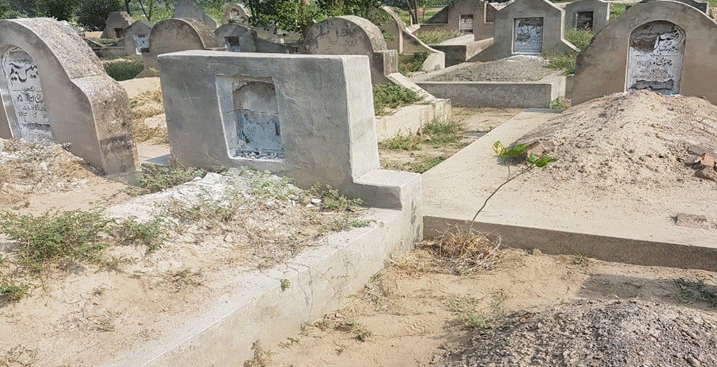The tragic story of Qudsia Tabassum, a woman from the Ahmadi community in Daska, Sialkot, who passed away two days ago, is an example of the deepening religious intolerance in Pakistan. Despite being deceased, her body remains in the mortuary, denied burial by the hardline elements of society—specifically, the Tehreek-e-Labbaik Pakistan (TLP) group—backed by local authorities.
Qudsia’s grave was supposed to be in a graveyard originally owned by the Ahmadi community, located in Piru Chak Tehsil, Daska, under the jurisdiction of Police Station Motra. This graveyard, historically owned by the Ahmadis, was generously shared with other communities, epitomizing a spirit of coexistence. However, since the rise of TLP influence in the area, this peaceful arrangement has been shattered, leading to a sequence of disturbing events that have now turned into a crisis for the Ahmadi community.
A representative from the Ahmadi community, Babar*, explained that this graveyard has been the final resting place for many Ahmadis, with over 200 graves belonging to the community. Yet, when the community attempted to bury their own, they were met with opposition, fueled by TLP extremists who have increasingly flexed their muscle. Babar stated that the local authorities, including the Assistant Commissioner and District Commissioner, have not only turned a blind eye to the issue but have actively sided with the hardline groups. “Whenever we approach them, they ask us to ‘let it go,’” he said.
This is not the first time that the Ahmadi community in Daska has faced such adversity. According to Babar, this obstruction to burials has been happening repeatedly for several years. In one such instance, the community was forced to shift the body to Rabwah for burial after local authorities sided with TLP workers. Yet, this kind of treatment continues to unfold with disturbing regularity, slowly becoming an accepted practice.
What is more disheartening is the silence from the authorities. Their silence is more than just indifference; it is a tacit endorsement of the TLP’s extremist actions.
The Ahmadi community has faced religious discrimination and violence for decades, but now, they are being denied even the most basic rights, such as burying their loved ones. The graveyard in question, though shared with other communities, has 200 graves belonging to Ahmadis and about 100 from other communities. The Ahmadis have never objected to others being buried there, but when it comes to their own, they are met with violence and resistance.
The Ahmadi community is not blind to the significance of the situation. A letter issued by the District Peace Committee in 2022 confirmed that the graveyard had been allocated to the Ahmadi migrants during the creation of Pakistan. However, despite Ahmadis being declared non-Muslims in 1973, no disputes arose until recently, when hardline elements, backed by the TLP, started interfering. Now, the community is left grappling with a choice between forcing the local administration to act or seeking justice in the courts—a path fraught with delays and uncertainty.
In the face of these growing tensions, Babar has proposed two potential solutions: either seal the entire cemetery to prevent further conflict or allocate a separate space for the Ahmadi community to bury their dead. But in the current climate, where even the authorities are complicit in fueling these religious tensions, finding a peaceful resolution seems increasingly unlikely.
This incident is a microcosm of the broader struggle Ahmadis face in Pakistan. The government and law enforcement agencies are failing to protect their citizens’ rights, and in fact, actively enabling religious extremists to persecute minorities. The TLP’s role in this obstruction is not just a local issue; it is a reflection of how far Pakistan has fallen from its founding ideals of religious freedom and tolerance. The authorities’ refusal to take action against these extremists only emboldens them and sends a dangerous message to the entire nation: that religious minorities are dispensable.
As the body of Qudsia Tabassum remains in the mortuary, the message is clear. In Pakistan, the rights of minorities—especially the Ahmadi community—are being trampled upon by extremist groups like the TLP, with the silent approval of the state. This is not just an issue of burial rights, but a stark reminder of the growing intolerance and persecution faced by religious minorities in Pakistan. It is time for the authorities to act, to ensure that religious freedom and human dignity are upheld, and to stop the rising tide of extremism that threatens to engulf the nation.
